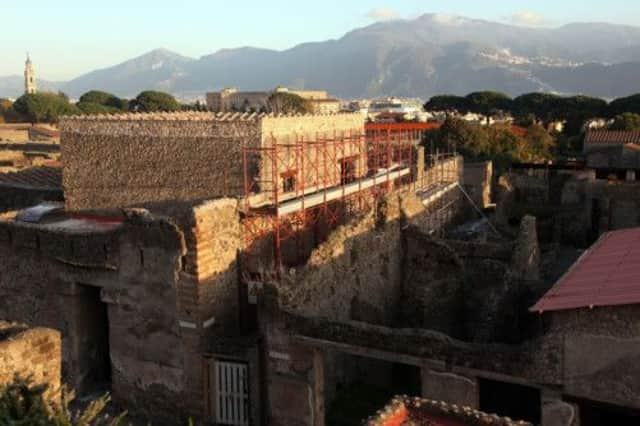Policeman to run Pompeii and stop mafia profiting


General Giovanni Nistri, from Italy’s paramilitary Carabinieri police, has been told to run the excavated Roman city near Naples, in the wake of a decision by the European Union and Italy to pour in €105 million (£88m) for restoration efforts aimed at stopping the site disintegrating after years of neglect.
One of his key tasks will be preventing the cash from Brussels ending up in the pockets of local firms controlled by the powerful Naples Camorra mafia.
Advertisement
Hide AdAdvertisement
Hide Ad“This appointment is a positive signal, because one of Pompeii’s key problems is the keen interest of the mafia in winning business at the site,” Salvo Barrano, of Italy’s National Association of Archaeologists, said.
Earlier this year, a former contractor was placed under house arrest on suspicion of inflating costs by 400 per cent.
Meanwhile, heavy rains in the autumn caused part of a wall to collapse on one of Pompeii’s main streets. Then, a week ago, plaster fell from the wall of the frescoed House of the Small Fountain, the latest in a series of collapses.
After being buried by falling ash from Mount Vesuvius in 79AD, Pompeii was first excavated in 1748, revealing perfectly preserved streets and even curled up corpses.
The alarm about the Unesco site’s preservation was first raised in 2010 when the frescoed House of the Gladiators collapsed, and experts say custodians hide pieces of crumbling wall from tourists.
Between 2007 and 2010, Gen Nistri ran a unit of the Carabinieri that tracks stolen Italian artefacts and rounds up tomb raiders who prey on Italy’s hundreds of unprotected and underfunded archaeological digs.
His appointment follows a visit to Pompeii in February by European commissioner Johannes Hahn, who complained that 55 years ago it was possible to visit 50 areas at Pompeii, whereas only five were now open.
On Monday, Italy’s culture ministry said more than €6m of the EU funds had already been used to start work on the restoration of five houses.
Advertisement
Hide AdAdvertisement
Hide AdCulture minister Massimo Bray said: “Pompeii doesn’t need money. The project that has been launched has all the resources it needs to get under way.”
But critics have warned that little attention is still being paid to low-cost, day-to-day maintenance, such as clearing drainage channels, that the site desperately requires.
At the nearby site of Herculaneum, where privately backed restorers have focused on continuous maintenance, less damage has been caused by winter storms.
Not all damage at Pompeii is due to neglect. A former manager at the site appointed by Silvio Berlusconi has been criticised for using concrete and stone blocks on sections of the town’s open air Roman theatre to better facilitate the staging of modern-day plays. The work has “permanently damaged” the theatre, according to Italian daily Corriere della Sera.
The manager, Marcello Fiori, who is under investigation, also reportedly spent more than €100,000 on a survey of 55 stray dogs living among the ancient buildings.